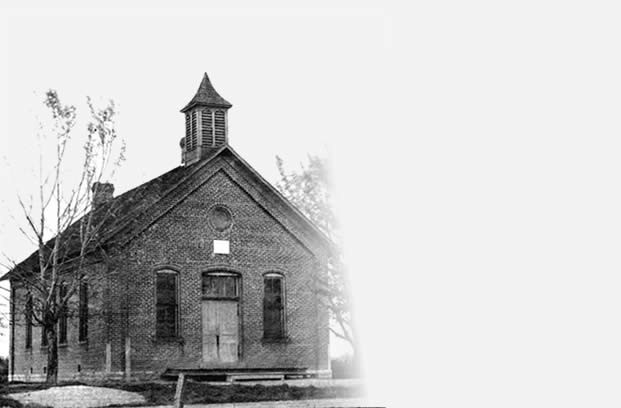Lewis Settlage, who Has Lived All of His Life on Farm Southeast of St. Marys, Has Fond Memories of Family Devotions Led By Hs Father Which Left Imprint on Him
Lewis H. Settlage was born on the farm on which he still lives and he spent his entire life there. His farm is east of Highway 29, about two miles south east of St. Marys. He is a quiet, unassuming, devout individual, a son of the late well known Frederick Settlage and his wife Mary nee Wierwille. His grandparents came here from Germany and settled on an adjoining farm in 1845. In 1855 the Cholera epidemic struck the Settlage family and in quick succession Lewis Settlage’s grandfather and two of his children died from it. His grandmother was left with five children and the very next year moved on what is today the Lewis Settlage farm. Her son Frederick, Lewis Settlage’s father was then 15 years old.
Mr. Settlage’s father was a widely read, thoughtful and deeply religious person whose spirituality left a deep imprint upon his children. Among Lewis Settlage’s earliest recollections of his father are the family devotions around the table and the religious discussions that took place in their home on evenings when the neighbors would come in. Lewis Settlage loved these discussions and was content to sit quietly in the corner and just listen. The next day he would ask his father for further information on such parts of the discussion as particularly interested him.
He attended the nearby Lutterbeck school, attending on and off until he was about 18 years old. But during the last years, attendance was limited to such days in the winter as he was not needed for clearing the land, felling trees, or splitting or sawing wood. Among his teachers were Henry Holtkamp, Jesse Clark, Maud Mahem, Ernest Holtkamp, J. A. W. Kuck, Wm. Snethkamp and August C. Settlage. Boys were boys in those days also. He recalled that one of his teachers was engaged to be married to young lady who lived just across the road from the school. One noon the teacher went to visit her, apparently forgot to look at his watch, and over stayed. The pupils meanwhile all gathered in the school room and locked their teacher out. However he had his keys with him, unlocked the door and entered. Thereupon the pupils applauded him vigorously and he took it good naturedly. Discipline was stern and punishment was dealt out to fit the particular misdemeanor. For minor offenses you had to stand at the black board or on a certain high dunce seat. When a pupil was guilty of, for instance kicking another pupil, he would be sent to the hitching post in the school yard and would have to kick the hitching post until the teacher said it was enough. We imagine the punishment usually effected a cure! Pupils were usually kept from crying by the threat “If you cry I’ll have to punish you.” But during the years that he attended catechetical instruction preparatory to confirmation, his school attendance suffered. He was required to attend religious instruction every Tuesday and Friday from 10 a.m. to 3p.m. This was conducted by his uncle, the late Pastor Kuckherman of New Knoxville. He was confirmed at the age of 15 and received as his Confirmation Memory verse 1 Timothy 6:12 “Fight the good fight of faith, lay hold on eternal life, where-unto thou art also called, and hast professed a good profession before many witnesses.” This verse made a deep impression upon him at the time and has served as a life long reminder to faithfulness in his religious life and duties. He became a Sunday school teacher at an early age and regularly participated in home prayer meetings every Wednesday evening and in the Sunday School teachers study meetings every Friday evening. “I loved those meetings. I really did,” said Mr. Settlage, and he still is a regular attendant at the Wednesday evening prayer meetings.
Any night-time social life centered around the church, either Sunday evening services, or prayer meetings or teachers’ meetings. And it was on these occasions also that he began walking home after church with a young lady named Rosa Heil who, at that time was employed by the late Wm. Duhme of New Knoxville. They were confirmed together, knew each other all their life, and at the age of about 20 started “going together.” Sunday night was date night and his bicycle served him faithfully for the trip to her home. They were married at the Settlage home where they have lived since, and both continue to enjoy good health. Their son, Noah Settlage farms the home farm and Papa and Mama Settlage of course cannot resist pitching in and helping where ever and when ever there is work to be done. They celebrated their golden wedding anniversary last year.
Youthful recollections of farm life include the days when the Settlage boys would trap wild turkeys, winter butchering when the years meat supply would be laid in and when the whole neighborhood would turn out for the event, the threshing season which required as many as 20 to 25 men, but especially the oil boom. They struck oil on the Settlage farm in 1895 and two companies vied with each other in digging operations. Not only did they dig wells, but the oil men also took frequent digs at each other. A total of 16 wells were sunk on the Settlage farm. Natural gas was plentiful.
Mr. Settlage does not think that the world is getting better. He sees menacing storm clouds on the horizon. The Russian enigma, our ever mounting national debt, the prevalence of crime and delinquency, the soaring divorce rate, the ungodliness of multitudes, the increasing secularization of the Sabbath, combine to darken the future of America, Mr. Settlage believes. “However, as in the days of Elijah, much good remains in the world, and we must never think that there is no good left in the world. But the farther that we as a nation get away from God, the greater the miseries that we bring upon ourselves.”
Mr. Settlage’s philosophy of life is thoroughly religious. He has conscientiously sought to be true to his confirmation memory verse. He affirms “I know who I have believed!” He has found the Bible the well-spring of eternal truth whose waters quench and satisfy the thirst of the soul. Both morning and evening they daily drink at this Spring. His advice to youth is embodied in the 37th Psalm, reading in part: “Trust in the Lord and do good: delight thyself also in Him and he shall give thee the desires of thine heart. Commit thy way unto the Lord; trust also in Him, and he shall bring it to pass. Rest in the Lord, and wait patiently for Him; depart from evil and do good. Wait on the Lord, and keep His way.” “Act upon that advice” says Mr. Settlage, “and you will learn by experience that it is true. When we live unto the Lord, we can then be patient in adversity, thankful in prosperity, and can count on the guidance of God as we face tomorrow.”
Their living children are Rev. Herman Settlage, Belvedier, Tennessee; Lydia (Mrs. Lawrence Schroeder), R. R. 3, St. Marys; Noah Settlage, on the home farm. They have 13 grandchildren. His two sisters are Mrs. Buckloh and Mrs. Henry Hilgeman. His brother, Rev. Wm. Settlage died 1941, and Theodore in 1935. After the latter’s death the Lewis Settlages have made a home for Theodore’s sons Frederick and Richard.
Since the age of 18 Mr. Settlage has been active in Church work, beginning as a Sunday School teacher and choir singer and in later years as a consistory member and elder and up to a few years ago as Chairman of the Consistory of his church. He expresses himself as having enjoyed life, as being grateful to God for His blessings, and he is of a congenial and reflective disposition.
Comment: The Settlage farm which was farmed by Noah Settlage at the time of the interview, and subsequently by his son Lester, is located at 06289 Cloverleaf Road.
Living Biographies
by Andrew Kay
In 1949 and 1950, Reverend Edwin Andrew Katterhenry (1900-1963), a minister and a native of New Knoxville, wrote the “Living Biographies” feature for the St. Marys Evening Leader under the pen name of Andrew Kay. These articles consisted of interviews with aging citizens, many from New Knoxville and St. Marys, relating their experiences from their younger days. After Rev. Katterhenry passed away in 1963, his widow, Florence Katterhenry returned to New Knoxville to live out the remainder of her years until 1982. For those of us who are grandparents today, we remember her as “Mrs. K”. In the final “Living Biographies” article Andrew Kay wrote about himself, thus revealing his identity to the general public.


